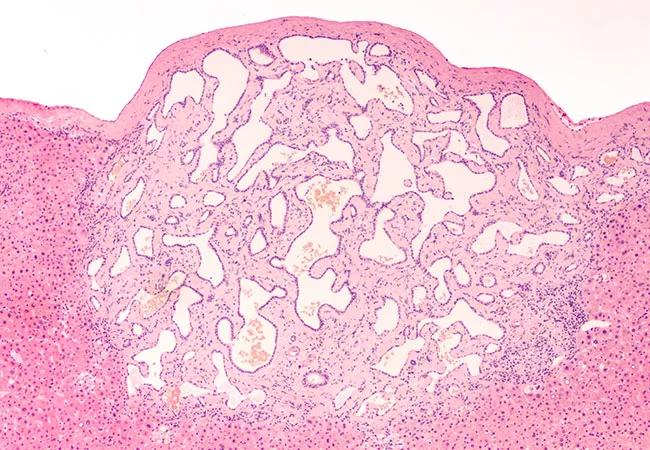Findings support need for personalized disease management

This article has been excerpted and reprinted from Lerner Research Institute News.
Advertisement
Cleveland Clinic is a non-profit academic medical center. Advertising on our site helps support our mission. We do not endorse non-Cleveland Clinic products or services. Policy
Genomic characteristics of breast cancers associated with PTEN hamartoma tumor syndrome (PHTS) differ from those found in sporadic breast cancers, according to new findings published in the American Journal of Human Genetics. This has important implications for the personalized management of PHTS-related breast cancers.
PHTS is a hereditary cancer predisposition syndrome caused by germline mutations in the tumor suppressor gene PTEN that increases the lifetime risk of breast cancer up to 85% compared to 12% in the general population. “As clinical genetic testing becomes more widely accessible, we undoubtedly will see a rise in the incidence of PHTS-associated breast cancer,” said Charis Eng, MD, PhD, Inaugural Chair of the Genomic Medicine Institute at Cleveland Clinic’s Learner Research Institute and Inaugural Chair and Director of the Center for Personalized Genetic Healthcare. “PHTS-associated breast cancers often develop at a younger age and may progress more aggressively than their sporadic counterparts, but they are treated similarly, which underscores the need to better understand any underlining genomic differences between PHTS-associated and sporadic breast cancers.”
To address this need, the researchers performed exome sequencing on samples from 44 women with germline PTEN mutations who developed breast cancer and compared the data to samples from women with sporadic breast cancers.
They specifically investigated somatic mutations in both groups because it is posited that both copies of a tumor suppressor gene must be mutated in order for cancer to develop, which is known as Knudson’s two-hit hypothesis.
Advertisement
“Following this hypothesis, individuals with PHTS inherit the first PTEN mutation, or the first hit, and then acquire the second hit via a somatic mutation on their other PTEN gene,” noted Dr. Eng. “In contrast, sporadic cancers would occur when both tumor suppressor genes are mutated randomly, which is less likely or takes longer, thus helping to explain why the risk for developing cancer at an earlier age is greater for those with germline mutations.”
Their analysis revealed that PHTS-associated breast cancers have distinct somatic mutational profiles compared to sporadic breast cancers. For example, they discovered that PTEN and PIK3CA were the most frequently somatically mutated genes in PHTS-associated breast cancers while TP53 was most frequently mutated in sporadic breast cancers. Notably, the PHTS group had a significantly higher frequency of somatic PTEN mutations compared to the sporadic group, as well as a lower mutational frequency in PIK3CA, indicating that somatic mutations in PTEN are the main drivers of PHTS-associated breast cancers. In addition, they found that somatic mutations in PTEN and PIK3CA were mutually exclusive in the PHTS group, but not in the sporadic group.
“Our findings reveal a distinct breast cancer biology in the context germline PTEN mutations that spotlights the need to develop more targeted, personalized strategies to effectively treat and, in time, prevent PHTS-associated breast cancers,” said Dr. Eng.
The study was supported in part by the Breast Cancer Research Foundation.
Advertisement
The full-length article is available at Lerner Research Institute News.
Advertisement
Advertisement

Radiation therapy helped shrink hand nodules and improve functionality

Standard of care is linked to better outcomes, but disease recurrence and other risk factors often drive alternative approaches

Phase 1 study demonstrates immune response in three quarters of patients with triple-negative breast cancer

Multidisciplinary teams bring pathological and clinical expertise

Genetic variants exist irrespective of family history or other contributing factors

Study shows significantly reduced risk of mortality and disease complications in patients receiving GLP-1 agonists

Structured interventions enhance sleep, safety and caregiver resiliency in high-acuity units

Addressing rare disease and challenging treatment course in an active young patient